Iran Signs Deal To Export Gas Technical Services To Romania
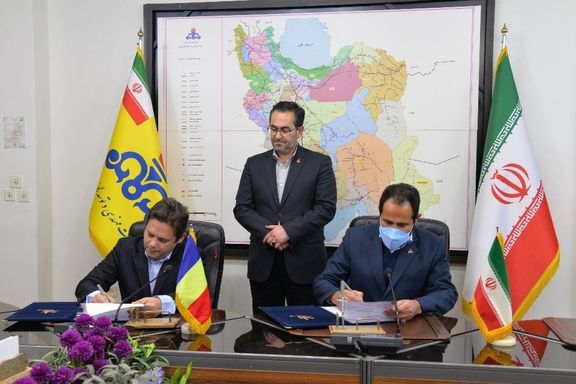
Iran has signed a deal with Romanian company to export technical and engineering services for the gas industry to the European Union member country.

Iran has signed a deal with Romanian company to export technical and engineering services for the gas industry to the European Union member country.
IRNA said on Tuesday that a memorandum of understanding was signed by the head of Iran Gas Engineering and Development Company, Reza Noshadi, and Mihai Tănăsescu from the Romanian company Gaz Vest.
Under the agreement, Iran will cooperate with the Romanian company in construction of gas pipelines and pressure boosting facilities as well as building gas storage reservoirs.
According to Noshadi, the two countries are trying to find other cooperation opportunities, including joint ventures and building refineries or power plants, while a joint working group is also formed so that they can share their technical know-how and experience.
Romania is the first European country that is importing technical and engineering services from the Islamic Republic.
Earlier in January, the head of Tehran Chamber of Commerce, Masoud Khansari, said Iran’s export of technical and engineering services has plummeted to about $200 to $300 million from about $5 to $6 billion in the past few years.
Last week, Iran’s President Ebrahim Raisi said that Iran’s oil exports have increased by 40 percent and Tehran pursues a dual-track policy of circumventing US sanctions and working for their removal.
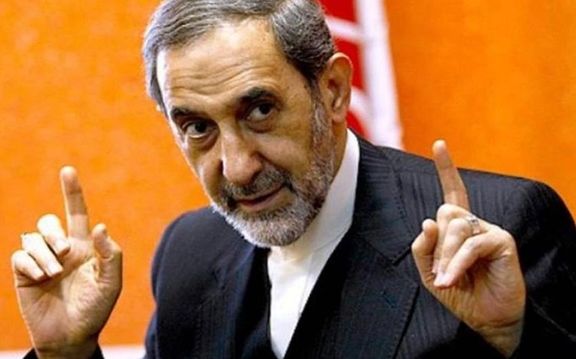
Ali Akbar Velayati, foreign relations advisor to Supreme Leader Ali Khamenei, has said the United States would not dare to attack Iran.
"Iran's regional power is on the rise,” Velayati said in an interview with hardliner Kayhan newspaper published Tuesday. “Iran has never been as strong during the Islamic Republic era and has substantial power and influence in the region and internationally now. Americans confess that they have to deal with three powerful countries, [namely] Iran, China and Russia.”
The interview focused on Velayati’s defense of a "looking East" tilt in foreign policy with President Ebrahim Raisi (Raeesi) due in Moscow Wednesday. Velayati, who was foreign minister 1981-97, said Iran's power had grown so much that its enemies, "particularly Americans," realized they could not attack without serious “consequences.”
Velayati also argued that closer relations with China and Russia offered Iran a way to “lift” and “neutralize” US sanctions, which have expanded and tightened since the US in 2018 left the 2015 Iran nuclear deal, the JCPOA (Joint Comprehensive Plan of Action). Russia in particular has been supportive of some Iranian demands during Vienna talks aimed at reviving the JCPOA.
Critics of the Raisi government, which took office in August, and many in the Iranian public, are wary of Iran's closer relationships with China and Russia. Some social media posts claim Raisi’s government has tipped the balance in its foreign relations completely in favor of the two eastern powers and is “selling out” the country.
Political analyst Ali Bigdeli has alleged that China and Russia might sacrifice Iran’s interests, including its nuclear program, to secure their own interests in Ukraine and Taiwan. "They may strike a secret deal [with the US]," Bigdeli was quoted as saying by Aftab-e Yazd newspaper Tuesday.
But the aim of the previous government under President Hassan Rouhani to use the JCPOA as a stepping stone to attract European investment, especially in energy, was undermined by US ‘maximum pressure’ sanctions, which threaten punitive action against any third party buying Iran’s oil or dealing with its financial sector.
Commenting on the chances of an agreement over restoring the JCPOA, Fereydoun Abbasi, lawmaker and former head of the Energy Organization of Iran Agency told the Iranian Students News Agency (ISNA) Tuesday that an agreement would be viable only if Iran "maintains its power in the region" and puts pressure on Israel.
Abbasi argued Iran needed to extend its "trenches against the enemy outside the borders of Syria,” to “put pressure on the Zionist regime,” which he said was lobbying against Iran. Abbasi suggested that a desirable result in the nuclear talks was linked to strengthening ties with allies across the Middle East, with the aim of lifting the Israeli and Egyptian “siege on Gaza” and freeing Syria’s Golan region, which has been occupied and settled by Israel since 1967.
"We should negotiate [with world powers] but we will not achieve our country's desired result in the talks as long as there is not pressure on the Zionist regime,” Abbasi said.
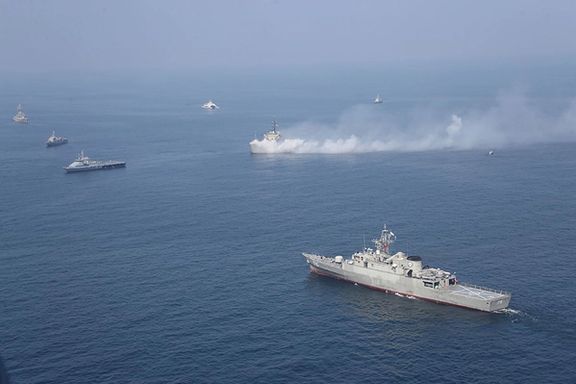
The Russian Pacific Fleet says it will take part in joint naval war games with Iran and China in without announcing the exact date and location for the drills.
The fleet’s press service said Tuesdaythat a delegation of Navy personnel has traveled to Iran’s southeastern port city of Chabahar for a planning session and preliminary coordination.
A detachment of warships from Russia’s Pacific Fleet, including large sea tanker Boris Butoma and Russian destroyer Admiral Tributs as well as missile cruisers Varyag and Guards Order of the Nakhimov, will join the Iranian and Chinese fleets for the drills.
The unit set out on a voyage from the southern port of Vladivostok in Far East Russia a few days before the 2022 New Year and anchored near Chabahar port on the Sea of Oman earlier in the week.
In August 2020, the Russian ambassador in Tehran, Levan Dzhagaryan, had said that joint naval exercisesin the Persian Gulf would take place at the end of 2021 or early 2022.
He had also said that the main focus of the exercises was to ensure safe navigation in international shipping lanes and anti-piracy operations.
Announcing the formation of Marine Security Belt -- also known as the portmanteau CHIRU -- China, Russia and Iran held their first joint naval drills in the region in the very last days of 2019.

Lebanese newspaper al-Akhbar says the United States has sought to have a communication channel with the Iran-backed Hezbollah group in Lebanon.
According to al-Akhbar on Tuesday, the US government has delivered a message to Hezbollah via mediators, asking for a way to discuss various issues regarding Lebanon.
The report said Hezbollah informed the mediators that they reject any form of communication with the Americans.
Hashim Safi Al Din, a senior Hezbollah official -- and a maternal cousin of Hezbollah secretary general Hassan Nasrallah – has reportedly confirmed the claim, saying that Americans tried to communicate with the Hezbollah leadership.
He said that a mediator carried the message, expressing Washington’s readiness to negotiate over any issue, but Hezbollah refusedwithout any discussion whatsoever.
Although such claims may be plausible, they are rarely officially reported and cannot be independently verified.
Recently, Israeli media reported that a deal was secretly signed with Beirut to supply natural gas to Lebanon through Jordan and Syria, adding that the agreement was brokered by Washington’s special envoy and coordinator for international energy affairs Amos Hochstein and also coordinated with Russian President Vladimir Putin.
The Lebanese government and the US state department later denied the existence of such an agreement.
Lebanon has experienced an unprecedented economic breakdown since 2019, and some blame Hezbollah for the country’s isolation.
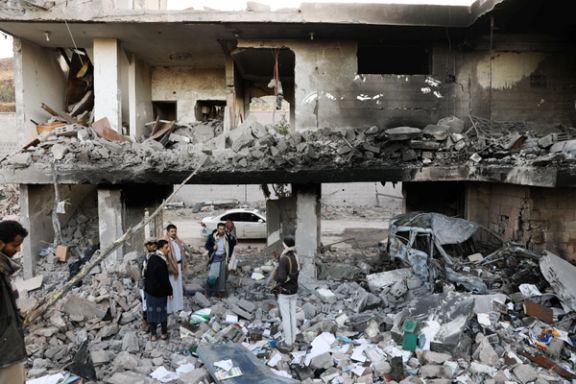
An air strike killed about 14 people in a building in Yemen's capital Sanaa, residents said on Tuesday, in attacks by the Saudi-led coalition fighting the Houthi group.
The alliance strikes on Houthi-held Sanaa followed an attack claimed by the Iran-aligned Houthis on Monday on coalition partner the United Arab Emirates, in Abu Dhabi, in which three people were killed.
The coalition also said it intercepted eight drones launched toward Saudi Arabia on Monday.
Early on Tuesday, the coalition said it had begun air strikes against strongholds and camps in Sanaa belonging to the Houthi group, Saudi state media said.
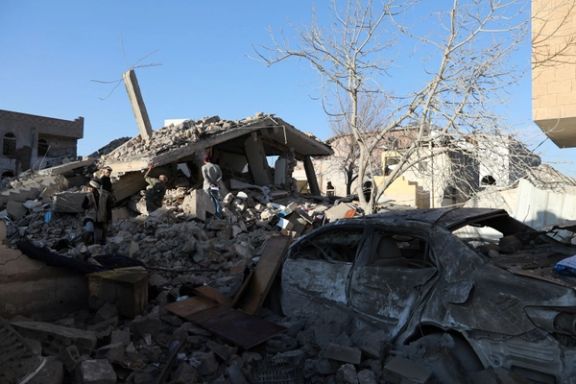
The strikes appeared to be the deadliest since 2019 on Sanaa.
The strike that killed about 14 people, according to initial estimates, was on the home of a Houthi military official.
It killed him, his wife, his 25-year-old son, other family members and some unidentified people, a medical source and residents told Reuters.
The UAE has armed and trained Yemeni forces that recently joined fighting against the Houthis in Yemen's energy-producing regions of Shabwa and Marib.
Monday's Houthi-claimed attack on two sites in the UAE set off explosions in fuel trucks, killed three people and ignited a blaze near Abu Dhabi airport.
In response, the UAE said it reserved the right to respond to "terrorist attacks and criminal escalation".
Reporting by Reuters

As the United Arab Emirates vowed punishment for the Houthi missile and drone strike on key targets in the country, the United States also condemned the attack.
"The UAE condemns this terrorist attack by the Houthi militia on areas and civilian facilities on Emirati soil...(It) will not go unpunished," its foreign ministry said. "The UAE reserves the right to respond to these terrorist attacks and criminal escalation."
Iran-backed Houthi rebels Monday targeted a key oil facility in Abu Dhabi and the UAE capital's international airport with explosive-laden drones launched from Sana'a airport, the Saudi-led Coalition that backs Yemen's internationally recognized government said Monday.
The UAE, a member of the coalition, has armed and trained local Yemeni forces that recently joined fighting against the Houthis in Yemen's energy-producing Shabwa and Marib regions.
"With (nuclear) negotiators running out of time, the risk of a deterioration in the region's security climate is rising," said Torbjorn Soltvedt, principal MENA analyst at risk intelligence company Verisk Maplecroft.
US Secretary of State Antony Blinken, in a phone call with his Emirati counterpart, condemned the attack, the UAE state news agency reported.
A statement by the State Department said, "The United States strongly condemns the terrorist attacks in Abu Dhabi today, which struck civilian sites including Abu Dhabi’s international airport, killing and wounding innocent civilians." The US reiterated its "unwavering commitment to the security of the UAE"
White House national security adviser Jake Sullivan said Washington would work to hold the Houthis accountable.
The Biden Administration lifted the US terror designation imposed on Houthis almost a year ago, possibly to encourage a peace arrangement, but the Iran-backed group continued attacks against Saudi Arabia and rejected proposals for a ceasefire.
The UAE also hosts the US Navy and other forces. The Houthi threat that all UAE territory is within reach of its weapons could also be seen as a threat against the presence of the US military.
Houthi military spokesman Yahya Sarea said the group fired five ballistic missiles and "a large number" of drones at Dubai and Abu Dhabi airports, an oil refinery in Musaffah and several "sensitive" sites in the UAE.
The Saudi-led alliance carried out air strikes on Yemen's Houthi-held capital Sanaa, Reuters witnesses said, following the strike on the UAE and after the coalition intercepted eight drones launched toward Saudi Arabia on Monday.
United Nations Secretary-General Antonio Guterres condemned the attack on the UAE and urged "all parties to exercise maximum restraint and prevent any escalation", his spokesperson said.
French Foreign Minister Jean-Yves Le Drian said the attack threatened regional stability.
Riyadh and Abu Dhabi had moved to engage directly with Iran in recent months to avoid any wider conflict that could disrupt the region’s economy. The Yemen war is widely seen as a proxy war between Sunni Muslim Saudi Arabia and Shi'ite Iran.
The Houthi strike could derail UAE and wider Gulf dialogue with Iran, said UAE political analyst Abdulkhaleq Abdulla.
"The UAE is not going to take this very lightly," he said.
With reporting by Reuters